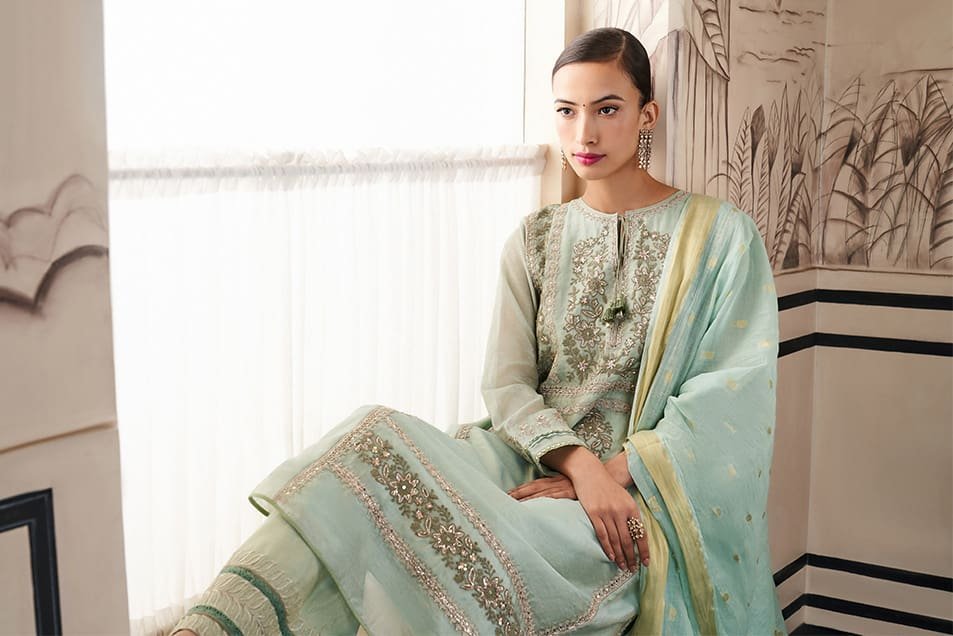Anita Dongre is a renowned Indian fashion designer and entrepreneur who is the founder of the House of Anita Dongre, an Indian fashion house. She was born on October 3, 1963, in Mumbai, Maharashtra, India. Dongre’s mother, Pushpa Sawlani, used to stitch clothes for Anita and her five siblings when they were kids. Later in life, Anita studied fashion design at SNDT college located in Mumbai, where she pursued a Degree course in Fashion designing. After completing her degree, Dongre designed and supplied designs for many of the country’s leading boutiques for 12 years, before launching her label. Dongre launched her jewelry brand Anita Dongre Pink City, which also features under House of Anita Dongre.

She later launched her clothing brands, which include AND, a western wear brand; Global Desi, a contemporary line; Grassroot, a sustainable luxury brand; and Anita Dongre, a bridal couture and prêt line, including menswear. Dongre’s brother and sister handle the operations of the business, while she focuses on the design front. She features as the Chief Creative Officer of the company. The House of Anita Dongre offers a range of clothing brands, including AND, Global Desi, Anita Dongre, and Grassroot. AND is a western wear brand, Global Desi is a contemporary line, Anita Dongre is a bridal couture and prêt line, including menswear, and Grassroot is a sustainable luxury brand. Dongre is committed to sustainability and eco-consciousness.

She works with artisans and has set forth several initiatives that benefit rural women and local artisans while reviving and sustaining Indian handcrafted traditions. Dongre’s foundation is committed to helping provide sustained employment to women through collaborations with organizations like Goonj and NEPRA, and with their local tailoring unit in Modgaon in Plaghar district. These women help upcycle the fabric waste generated in the clothing manufacturing process into godharis, carry bags, and reusable masks, which later go towards the aid of people and animals in need and as items to be sold in local markets.

Anita Dongre’s fascination with fashion started when she saw her mother, Pushpa Sawlani, creating beautiful garments with fabrics for her and her siblings when they were kids. Her mother was the first designer she was exposed to, and she was inspired by her creativity. Later in life, she studied fashion design at SNDT college located in Mumbai, where she pursued a Degree course in Fashion designing. After completing her degree, Dongre designed and supplied designs for many of the country’s leading boutiques for 12 years, before launching her label. She launched her jewelry brand Anita Dongre Pink City, which also features under House of Anita Dongre. She later launched her clothing brands, which include AND, a western wear brand; Global Desi, a contemporary line; Grassroot, a sustainable luxury brand; and Anita Dongre, a bridal couture and prêt line, including menswear. Dongre’s journey into fashion was inspired by her mother’s creativity and her passion for designing beautiful garments.
Anita Dongre’s design philosophy is centered around creating luxurious designs that enhance a person’s confidence and sense of self. She believes that fashion plays a defining role in this aspect. Her designs showcase Indian aesthetics in a contemporary language, and she is inspired by Rajasthan’s splendor and India’s rich craft tradition, which she aims to revive and sustain while empowering craftspeople. Dongre’s design philosophy is based on “Wear ability, comfort, and inclusiveness.” She was the first Indian designer to introduce standard sizing in the country for Indian women. Her commitment to sustainability and eco-consciousness is reflected in her brand’s initiatives that benefit rural women and local artisans while reviving and sustaining Indian handcrafted traditions. She works with artisans and has set forth several initiatives that provide sustained employment to women. Dongre’s foundation collaborates with organizations like Goonj and NEPRA, and with their local tailoring unit in Modgaon in Plaghar district, where women help upcycle the fabric waste generated in the clothing manufacturing process into godharis, carry bags, and reusable masks, which later go towards the aid of people and animals in need and as items to be sold in local markets.

